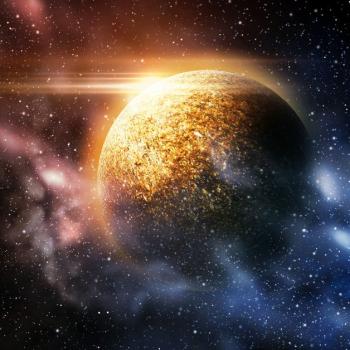Since the veneration of ancestors is an integral part of Heathenry, and because ancestry is technically about DNA, one might think that all Heathens are hard Folkish. There are some Heathens who believe that: if you don't accept the Folkish Assertion, those people say you're not Heathen. But not everyone agrees with that. Non-Folkish Universalist Heathens say that, of course, your ancestors are important. Your ancestors are important to you. They are important to you because they are yours, and that's all one can say about it. Pantheons and religions are a matter of choice, they claim. Ancestry has little or, more likely, nothing to do with it, and the gods really don't care.
Arguments over the Folkish Assertion have been going on for at least several decades now. These range from pointless to pointed to dangerously pointy. Some are uncontrolled flame wars. There is even a bit of Internet Lore surrounding this: the eponymous Jarnsaxa Scale attempts to measure just how Universalist or Folkish or Racist you are. I'm a 3 on this Scale. Your favorite search engine will likely find it for you if you want to know what that means.
One online discussion I participated in included a lot of informed opinion about breeds of animals, because one contributor noted that many domesticated animals are bred not just for their physical characteristics, but for their behavior. Indeed, when you get a terrier dog, part of what you're choosing is that distinctive terrier personality, which you probably won't be able to get rid of without getting rid of the dog. Border Collies understand boundaries and herding instinctively. And the kind of cattle my family raised when I was in high school were propagated for the quality of their meat in spite of a bad temper that breeding hadn't managed to eliminate. Perhaps "breeds of human animals" have statistically characteristic behaviors, too. Against this kind of argument, some will make counterclaims that we're people, not animals.
But yes, we are animals, and DNA really works, and my recent evening with my daughter and her birth mother shows me plainly that inheritance can account for far more than I would have thought, even in humans, the animal that can choose.
That assumption of an ability to choose is at the root of our ethical and legal systems. Do we deal with each other in terms of what we are, or who we are? This reminds me of a description I once read of the Aesir and the Vanir gods: the Vanir are the gods of the world as it is, and the Aesir are the gods of the world as it can be made to become. So, is it what, or who? Maybe the answer is both, whether we like it or not.
Can DNA really encode gods and religions? I'm spiritually skeptical. I have a math degree, with a fair amount of physics and chemistry mixed in, and this claim to me is still out there with the homeopathic claim that water "remembers" what used to be in it. But can DNA encode an inclination toward specific gods or religions? Depending on what you think gods are, that question is harder for me to dismiss.
As a matter of simple observation, almost all Heathens do have at least some Northern European ancestry. Most have a lot. We don't have hordes of ethnic Inuit or Bushmen or Mongolians breaking down the doors of The Troth or the AFA or any of the other organizations, trying to get in. Is folk religion really a matter of DNA? Or are most people just more interested in their own ancestors and ancestor cultures than in somebody else's? Is this a problem we need to be concerned about? If the Folkish Assertion implies a problem, that problem seems to police itself pretty well without any effort on anyone's part. The whole thing is little more than an academic curiosity to me.
During dinner with my daughter's birth mother, she did bring up her ancestry. That was interesting, and it is probably important to my daughter, but it is not important to me. For those of you who haven't had the adoption experience, try telling me, or anyone who's had it, that these are not our children, or that they shouldn't share our gods, and you're likely to get at least a figurative punch in the nose. The culture and family one grows up in matter, too. Then there's that pesky thing about individuality. Goodness knows, we have enough of that within Heathenry. Even our sumbels often honor our unrelated "spiritual ancestors," who begat us as individuals by nothing to do with biology.
And I have to remember my pleasant friend Sally and her family of extraterrestrials. If someone with other than the usual ancestry comes to me and says, "Yes, I know the Heathen gods, too," I'll be a little surprised, but not much. I will say Hail and Welcome, and I won't try to tell him that it can't be so.
Hail the Aesir! Hail the Vanir! Hail the Children of Rig!





